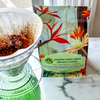




Ethiopian Haro Lebetu Guji Specialty Coffee
$19.95
Honey, Dark Chocolate & Raspberry: Premium Ethiopian Coffee
Experience the exotic flavours of Haro Guji, perfect for Batch Brew
Time to enjoy the vibrant flavours of this premium Arabica coffee, sourced from the respected Yabitu Koba region. Cultivated by the dedicated producer Welichu Wachu, these coffee cherries flourish at the lofty altitudes of 1800 - 2300, where they are handpicked during the prime harvest months of November and December.
With an impressive score of 89, each sip reveals a zesty twist of blood orange, the bright spark of lemon, and a whisper of dark chocolate.
The sweetness of honey meanders through, accompanied by a subtle hint of raspberry, creating a complex and harmonious taste profile.
Brewing Recommendations
- This single-origin coffee is best enjoyed as a pour-over or cold drip to bring out the abundant fruitiness from the beans. Its light roast and high acidity make it perfect for these brewing methods, though it is not recommended to be served with milk.
Suggested barista coffee making recipe
Espresso
Temp: 94°c
Group handle basket: 22g
In: 23g
Out: 50g (60ml)
Time: 30sec
Filter
Ratio: 1:16
Dose: 15g
Water: 250ml
Time: 2.30mins
Only use filtered water, unfiltered tap water spoils great coffee
The Difference between Washed and Natural coffee:
Coffee beans are encased in multiple layers: silver skin, parchment, pectin, pulp, and outer skin. There are three primary methods to process the coffee and extract to the finished coffee bean: washed/wet-process, natural/dry-process, and pulp natural.
Dry processed (naturals) coffees are dried in full on raised beds, or on patios in cherry prior to de-pulping. Wet processed (washed) coffees are dried without the cherry.
Washed coffees are de-pulped via washing stations then usually fermented to promote the separation of any remaining pectin still stuck to the bean and parchment, then washed clean prior to drying.
Naturals have more fruit flavours attributes as the coffee has had more time to interact with the natural sugars from the cherry as enzymes break down the mucilage around the bean.
Washed coffees are prized for their clarity and vibrant notes. Removing all the cherry prior to drying allows the intrinsic flavours of the coffee to excel. Fruit notes are still found in washed coffees, nonetheless, fermented and sweet berry notes are less common.
